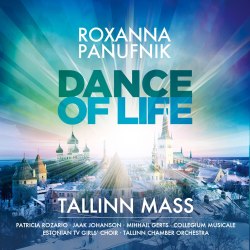|

|
Roxanna PANUFNIK (b.1968)
Dance of Life (2010) [56.11]
Patricia Rozario (soprano), Jaak Johanson (narrator), Laura Lindpere (kannel), Madis Metsamart (percussion)
Estonian TV Girls’ Choir, Collegium Musicale Chamber Choir, Choir of Estonian Academy of Music and Theatre
Tallinn Chamber Orchestra/Mihhail Gerts
rec. Studio 1, Estonian National Radio, Tallinn, 23-26 May 2013
WARNER CLASSICS 2564 64281-9 [56.11]
Last year I complained bitterly about the treatment meted out by Warner to Roxanna Panufnik in the reissue of a collection of her earlier choral works. On that occasion we were denied not only the texts but also any other information regarding the music. I suggested that the composer herself might care to complain about this to the record company, since the lack of the most essential details would decidedly compromise appreciation of her music. Whether she did so or not, this new release of her ‘Tallinn Mass’ Dance of Life amply makes recompense. We are given the composer’s own note on the origins of the work, the complete texts and to gild the lily also the original Estonian poems on which these are based - although the work is sung in English translation, of which more later. I suppose that congratulations to Warner are in order, since Heaven rejoices in a sinner who repenteth, or so I am given to understand.
The work itself is a conflation of the words of the Latin mass with a series of poems by Doris Kareva and Jürgen Rooste, originally set and performed in Estonian. Contrasted settings of this sort find their prototype in Britten’s War Requiem where the Latin liturgy forms a cruel and ironic counterpoint to the poems of Wilfred Owen. Panufnik’s work here is more closely allied to a piece like Bernstein’s Mass, where the contemporary verses paint a portrait of modern life and its problems. The narrator declaims a series of poems in the guise of various characters - Preacher, Beggar, Spy, Mayor, Banker, Prostitute, Ad Man - whose sense of dissatisfaction and frustration provokes a response from the soprano soloist in the role of Elu (Life). To each of them she seeks to provide a sense of purpose and reconciliation. The liturgical settings are woven around this series of colloquies, with a rather richer orchestral background which recalls at certain points - such as the plainchant-like opening of the Sanctus - the sense of ecstasy and restraint which we find in works such as Duruflé’s Messe cum jubilo.
The text of the mass is sung in the original Latin, but the Estonian words of the poems are here translated into English in a version described as “adapted by Jessica Duchen”, who explains some of the problems involved with the translation in a note in the booklet. Her adaptation is however sometimes inelegant - “Ah, those if-onlies!” - and sometimes seems to cry out for the use of a thesaurus when tautologies such as “I shall comply with compliance” simply fail to reflect the use of different words in the Estonian originals. The translation sometimes lands the soprano in particular with misplaced English emphases which simply sound unidiomatic - although Duchen tells us that she sought to avoid these. However the problems with the text are exacerbated by the soloists, neither of whom seems to be at all comfortable with the English language. Patricia Rozario copes ably with her wide-ranging vocal line, but in order to produce evenness of tone she horribly mangles far too many of her vowel sounds. Without the printed text in the booklet it would be almost impossible to decipher a single phrase of her singing. Oddly enough Jaak Johanson sounds more at home using quaintly accented tones, except in his assumption of the role as the prostitute where the use of a male speaker in a female role leads him to a high-pitched sort of delivery which conjures up images of a rent boy. This is not, I am sure, the impression that Roxanna Panufnik or the poet actually had in mind.
The orchestra is not large, but is skilfully used and never overpowers either the soloists - even in the tricky combination of spoken voice and instruments - or the choirs: two contrasted bodies of singers are used. Indeed one might wish sometimes for a more prominent role for the accompaniment. Only in the final minutes of the score does one get a sense of real emotional passion. Roxanna Panufnik’s use of the bell sounds of various Estonian churches provides a piquant counterpoint especially to the Latin settings, and the music is never less than beautiful in its poise and delicacy.
The composer states in her booklet note that the work can also be performed in a version for choirs and orchestra, omitting the Estonian poems. One suspects that it is in this form - under the title Tallinn Mass - that the future of this work may well lie. The fact that the choral music can be divorced from the remainder in this manner perhaps betrays the lack of unity between the two elements - can one imagine the same treatment being meted out to the War Requiem? Despite my strictures on elements in the treatment of the verses one might wish that the work in its original form would still retain a place in the repertory. In that case the use of the original Estonian is surely preferable.
This, as I have already observed, is a very beautiful work. The performance by the choirs and soloists realises the beauties of the score without any sense of strain in the sometimes high-flying vocal lines. The recorded sound too is excellent and clear throughout, although one could imagine that a cathedral acoustic might have been even better. The presentation of the work leaves nothing to be desired.
Paul Corfield Godfrey
 |
 |
|











